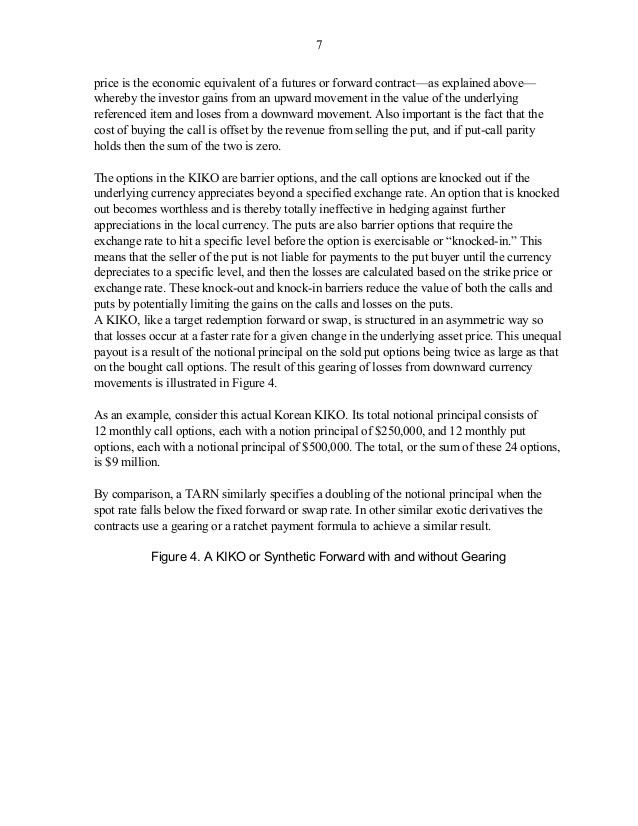Derivatives allow knowledgeable investors to hedge their bets
Post on: 23 Апрель, 2015 No Comment

by The Motley Fool — Nov. 17, 2011 12:00 AM
Universal Press Syndicate
Question: What are derivatives?
Answer: They’re financial instruments that include options, futures contracts, warrants and more.
Some are very creative devices. While shares of stock represent real ownership stakes in real companies, derivatives often represent contracts, not assets. They derive their value from the performance of other assets, such as stocks, bonds or commodities.
Derivatives permit sophisticated investors to hedge their bets, engage in arbitrage (profiting from differences in prices), lock in prices and use leverage (i.e. invest with borrowed money).
For example, several derivatives may be based on a single bundle of home mortgages, with one representing the bundle’s interest payments and another representing its principal payments. Since they will react differently to interest rate changes, they each will likely appeal to a different kind of investor.
Derivatives are typically used by large institutional investors to boost their overall return or to hedge against risk in their portfolios. Many can be very risky though, and when used aggressively, can result in investors losing more than their initial investment.
Q: What can I read to learn more about financial planning?
A: Ernst & Young’s Personal Financial Planning Guide (Wiley), which is available inexpensively, used, online. Also well regarded are the Wall Street Journal Complete Personal Finance Guidebook (Three Rivers Press, $15), Eric Tyson’s Personal Finance for Dummies (For Dummies, $22), and the Motley Fool Personal Finance Workbook by David and Tom Gardner (Touchstone, $16).
It’s great to educate yourself instead of handing over your money to someone else. Still, it can be smart to seek out a financial adviser sometimes, too. Learn how at napfa.org and sec.gov/investor/brokers.htm .
PepsiCo is looking sweet
PepsiCo recently reported its third-quarter earnings, with revenue up 13 percent over last year to $17.6 billion and core earnings up 7 percent. Investors are watching to see how effective price hikes will be in combating the inflation that’s been boosting supply costs and threatening profit margins. So far, so good, partly due to the company’s strong brand power.
Emerging markets continue to drive growth for PepsiCo, with snack volume up 31 percent in China and 26 percent in India, and beverage volume up 19 percent in India and up by double-digits in many other regions. What’s less good is the company’s continued struggle with its core carbonated soft drinks, particularly in developed markets.
Current PepsiCo investors have plenty of reasons to stick around. There are challenges to be met, but the company has many very strong brands, and its push into more nutritional offerings is a promising sign of forward thinking from management.
Investors on the sidelines may want to look into PepsiCo. The stock has fallen in the past few months and sports a dividend yield above 3 percent. The stock may not be a screaming bargain, but it’s a fair price for a great company. The Motley Fool owns shares of PepsiCo, and its newsletter services have recommended shares of the company and options on it.

Name that company
In 1837, my namesake made a steel plow in Illinois, and I was born. I morphed from a blacksmith shop into a manufacturer and, later, a retailer.
In 1866, I marketed my riding cultivator to wounded Civil War veterans, noting that those missing a limb could still work it.
I introduced wagons and buggies in the 1880s, and later introduced bicycles, tractors, combines, mowers and even fertilizer. I earned much farmer loyalty in the Great Depression, carrying debtors as long as needed. I built military equipment in World War II and was unionized in 1945.
Who am I?
Last week’s trivia answer. Born in 1946 and based in Orlando, I pushed plastic over glass and crockery. My products didn’t sell well initially because consumers needed demonstrations to appreciate them. I left retail outlets and shifted to direct sales.
Over the years, I’ve innovated with kitchen tools and products for microwaves. In recent years, I’ve added some new names to my flagship namesake brand: Armand Dupree, Avroy Shlain, BeautiControl, Fuller, NaturCare, Nutrimetics, Nuvo and Swissgarde. My sales force tops 2.5 million globally and likes to party and burp. My annual sales top $2 billion.
Who am I?
Answer: Tupperware Brands.














